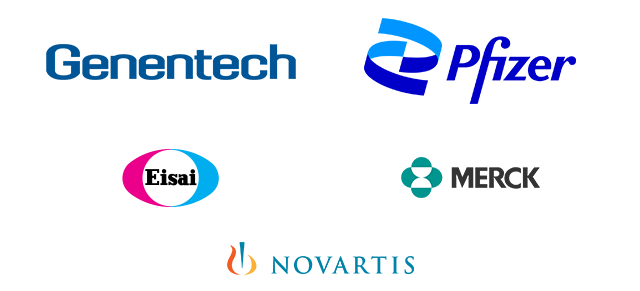2024 CPAT Symposium
See the conference agenda, read speaker biographies, and find more details about the CPAT Symposium.
Led by the CPAT Steering Committee, CPAT provides cancer survivors and caregivers with tools and training that build upon their personal experiences to become effective advocates to improve cancer care.
The CPAT webinars, newsletters, online forum, and conferences offer advocates different ways to learn and to discuss current issues, programs, and policies that affect the cancer community and to take action as appropriate.
NCCS will host the 2024 CPAT Symposium on June 26 – 28 in Arlington, VA. The CPAT Symposium is an event for both new and experienced advocates to develop advocacy skills, advocate for cancer policy on Capitol Hill, and learn about survivorship topics that impact the daily lives of cancer survivors and their families. Together, we are improving the quality of cancer care for everyone touched by cancer.
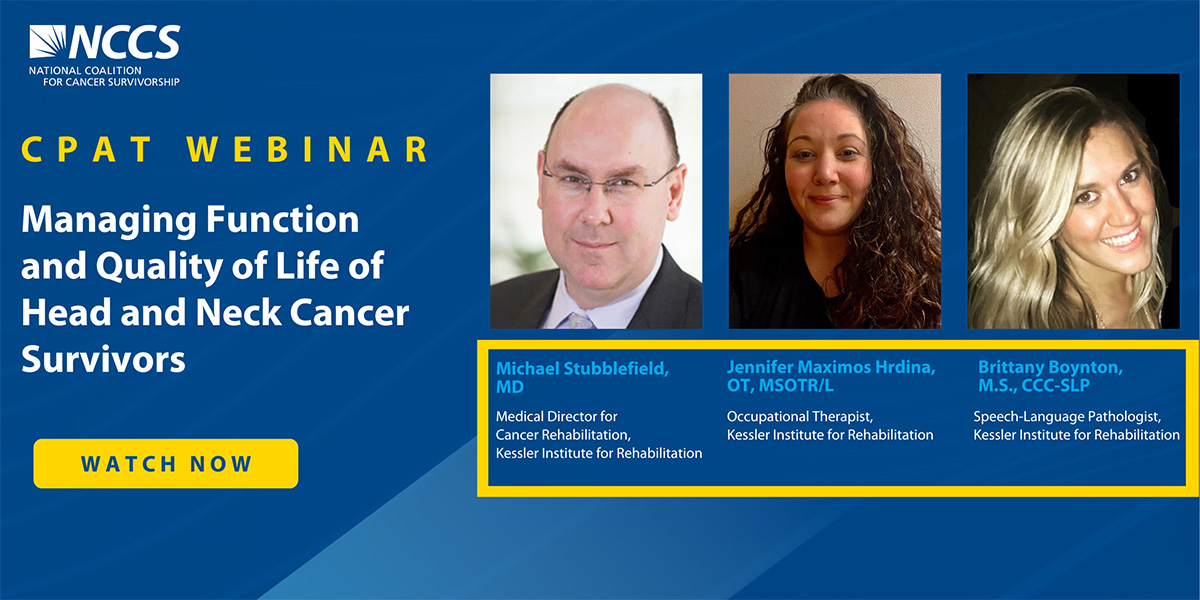 The treatment of head and neck cancer (HNC) often involves surgery, radiation, and chemotherapy. This treatment is critical for controlling or curing head and neck cancer. Though necessary, these treatments, particularly radiation therapy, can cause fibrosis (hardening) of the tissues, neck and face. This is known as radiation fibrosis. Radiation fibrosis can be painful and result in loss of neck movement, inability to open the mouth, trouble speaking, trouble swallowing, shoulder problems, swelling (known as lymphedema), and many other issues.
The treatment of head and neck cancer (HNC) often involves surgery, radiation, and chemotherapy. This treatment is critical for controlling or curing head and neck cancer. Though necessary, these treatments, particularly radiation therapy, can cause fibrosis (hardening) of the tissues, neck and face. This is known as radiation fibrosis. Radiation fibrosis can be painful and result in loss of neck movement, inability to open the mouth, trouble speaking, trouble swallowing, shoulder problems, swelling (known as lymphedema), and many other issues.
In this session, Dr. Michael Stubblefield of the Kessler Institute for Rehabilitation is joined by Speech Language Pathologist Brittany Boynton and Occupational Therapist Jennifer Maximos Hrdina, all of whom specialize in cancer rehabilitation. The team discusses how to know if you have radiation fibrosis, how medical professionals evaluate it, and importantly, how to treat it. NCCS CEO Shelley Fuld Nasso moderates a Q&A with the speakers after the presentation.
The goal of this session is to help you or your loved one with radiation fibrosis have the knowledge and tools to lead their best life.
During our Fall Cancer Policy Roundtable in November 2023, NCCS hosted a compelling series of panels and guest speakers, discussing important issues in quality cancer survivorship care. As many of our CPAT members across the country were unable to join this in-person event, we wanted to provide highlights from the roundtable on two of the topics discussed: Medicare Advantage and the drug pricing provisions in the Inflation Reduction Act (IRA).
This 60-minute webinar consists of two sessions. In the first session, Dr. Tricia Neuman of KFF addresses the benefits and trade-offs of Medicare Advantage plans — which now cover more than half of Medicare beneficiaries — as well as ways the program could be improved to better serve cancer survivors. The second session features Kirsten Axelsen of DLA Piper and Dr. Mariana Socal of Johns Hopkins University, who discuss implementation of the IRA, including anticipated benefits for patients, as well as the possible implications for pharmaceutical research and development. NCCS CEO Shelley Fuld Nasso moderates the discussions and asks questions from the webinar audience.
NCCS presents “Reconnecting to Life After Cancer: Permission to Feel,” a webinar featuring Kathy Washburn, a certified holistic cancer coach and cancer survivor.
In this webinar you will learn about the evolutionary function of both positive and negative emotions, understand that emotions offer data, and begin to practice awareness to empower you to respond — instead of react — to life.
As humans, we experience a constant inner stream of thoughts and feelings that serve a purpose — gauge safety and danger and set off reactions to both. Positive and negative emotions are not good or bad. They offer us unique data that we can learn to use in order to live with more ease and joy. Many of us learned to suppress our feelings, needs, and desires in service to others as a way that, at one time in our life, kept us safe, allowed us to cope with our surroundings. As we move through life, these old coping ways become maladaptive. Repression as a behavioral pattern is one of many factors in cancer risk and cancer recovery. Chronically suppressing needs and feelings to accommodate others weakens our immune system leaving us vulnerable to dis-ease.
Note: This webinar is life coaching, not therapy, and may not be appropriate for those experiencing significant and persistent emotional challenges.
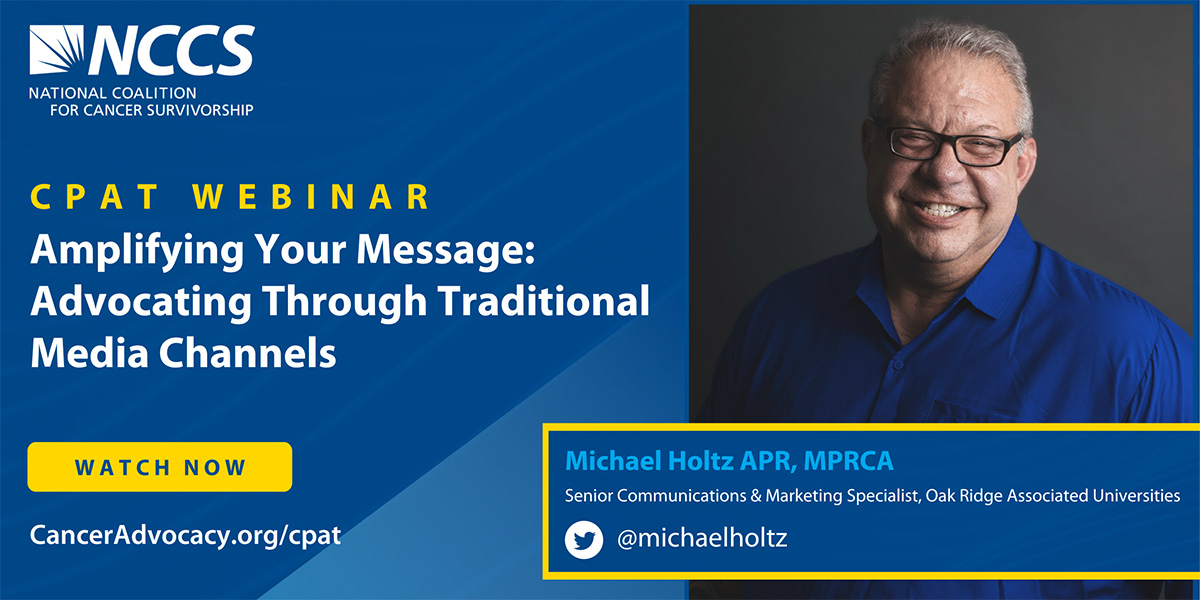 While social media is an important tool for amplifying cancer advocacy messages, traditional media outlets like newspapers, television, and radio, and their digital counterparts, are still relevant and can help raise awareness and put pressure on decision makers.
While social media is an important tool for amplifying cancer advocacy messages, traditional media outlets like newspapers, television, and radio, and their digital counterparts, are still relevant and can help raise awareness and put pressure on decision makers.
Drawing on his experience as a regional media advocacy director for the nation’s largest cancer nonprofit organization, as well as his current work as a volunteer for several organizations, Michael will share examples and best practices for working with and building relationships with the media.
In this webinar, you will learn how to make initial pitches to members of the media, get tips and tricks for getting coverage of events, and how to be prepared to share your story. Michael will also offer advice on the dos and do nots of media interviews and discuss the power of letters to the editor and op/eds for “giving legs” to advocates’ messages.
While this webinar will focus on amplifying the message of the survivorship legislation that we will advocate for at the CPAT Symposium, the information shared will benefit advocates who support any organization and their individual cancer journeys. Don’t miss out on this valuable opportunity to learn from an expert in the field and take your cancer advocacy efforts to the next level.
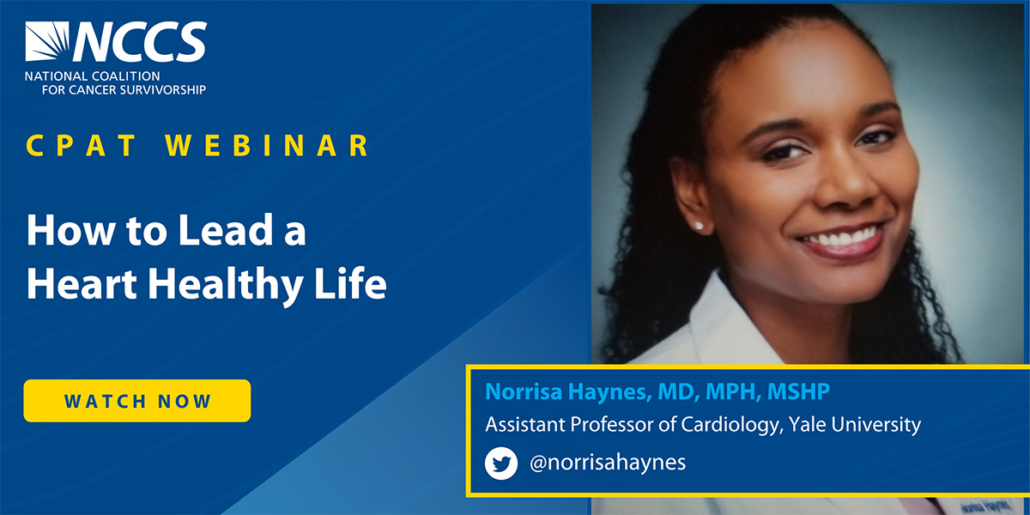 In this webinar hosted by NCCS, Cardiologist Dr. Norrisa Haynes of Yale University presents the basics of heart disease, including risk factors and the interplay between heart disease and cancer. Heart disease is still the leading cause of death worldwide, despite medical advancements, and can result from risk factors like high blood pressure, high cholesterol, diabetes, and obesity.
In this webinar hosted by NCCS, Cardiologist Dr. Norrisa Haynes of Yale University presents the basics of heart disease, including risk factors and the interplay between heart disease and cancer. Heart disease is still the leading cause of death worldwide, despite medical advancements, and can result from risk factors like high blood pressure, high cholesterol, diabetes, and obesity.
Dr. Haynes discusses cardiotoxicity, a common side effect of chemotherapy and radiation treatments that can result in heart disease. To manage cardiovascular risk factors, she suggests adopting heart-healthy lifestyle modifications, such as healthy eating, fitness, sleep, and blood pressure management.
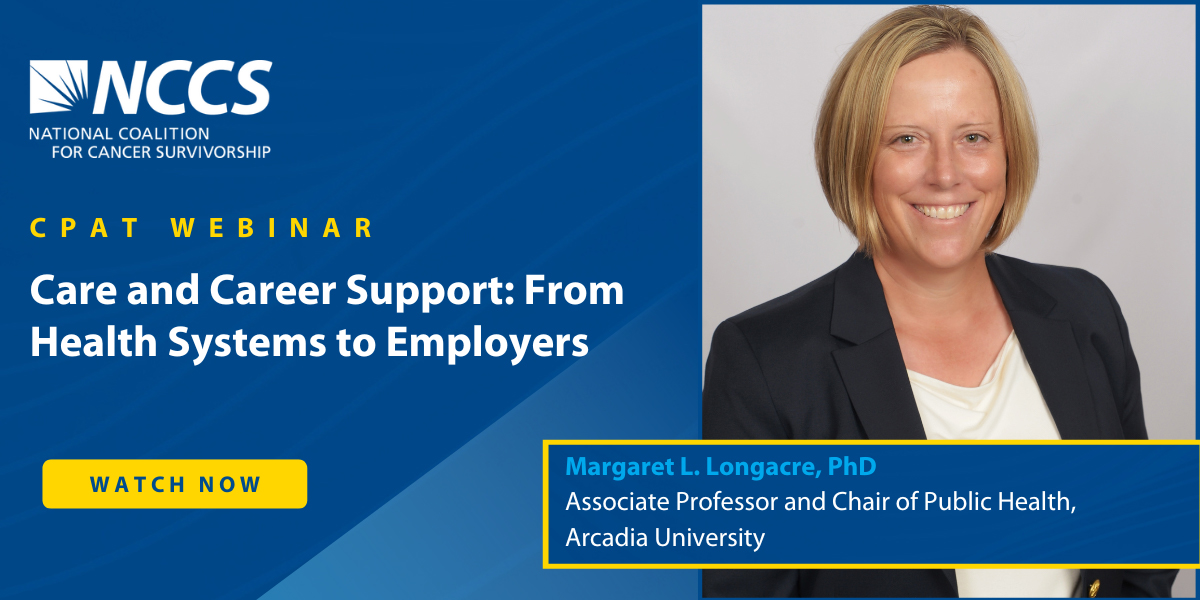 Learn about the unique demands of caregiving in cancer and strategies that employers and health systems might engage to support caregivers.
Learn about the unique demands of caregiving in cancer and strategies that employers and health systems might engage to support caregivers.
In this webinar, Dr. Margaret L. Longacre, Chair of Public Health at Arcadia University, presents data on the experiences and common issues faced by cancer caregivers in the US. Dr. Christina Sisti, a CPAT Member, describes her experience as a caregiver to her late husband and her own cancer diagnosis. Dr. Longacre’s colleagues Michele Cygan and Mary Sweeney offer possible solutions for supporting caregivers and present them in the form of a pair of checklists, one each for employers and employees.
Learn About:
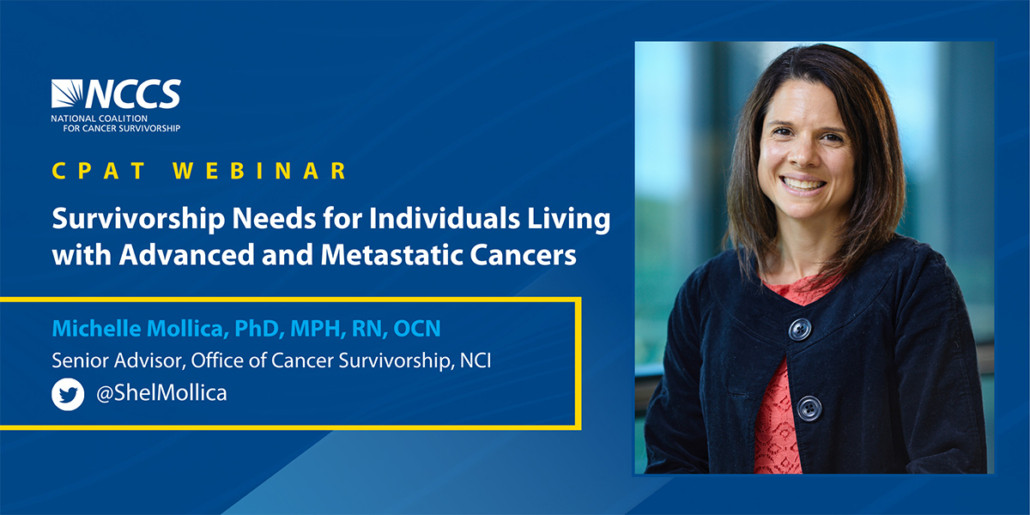 Dr. Michelle Mollica, Senior Advisor at the National Cancer Institute’s (NCI) Office of Cancer Survivorship, joined NCCS to discuss NCI’s recent efforts focused on understanding and addressing the survivorship needs for the growing population of survivors living with advanced and metastatic cancers. Bethany Ross, CPAT Steering Committee Member and Advocate, also participated in the discussion, sharing the challenges of being a young adult living with advanced and metastatic cancer. In this webinar, you’ll learn the findings from NCI’s research, and what the next steps are for supporting those living with advanced and metastatic cancers.
Dr. Michelle Mollica, Senior Advisor at the National Cancer Institute’s (NCI) Office of Cancer Survivorship, joined NCCS to discuss NCI’s recent efforts focused on understanding and addressing the survivorship needs for the growing population of survivors living with advanced and metastatic cancers. Bethany Ross, CPAT Steering Committee Member and Advocate, also participated in the discussion, sharing the challenges of being a young adult living with advanced and metastatic cancer. In this webinar, you’ll learn the findings from NCI’s research, and what the next steps are for supporting those living with advanced and metastatic cancers.
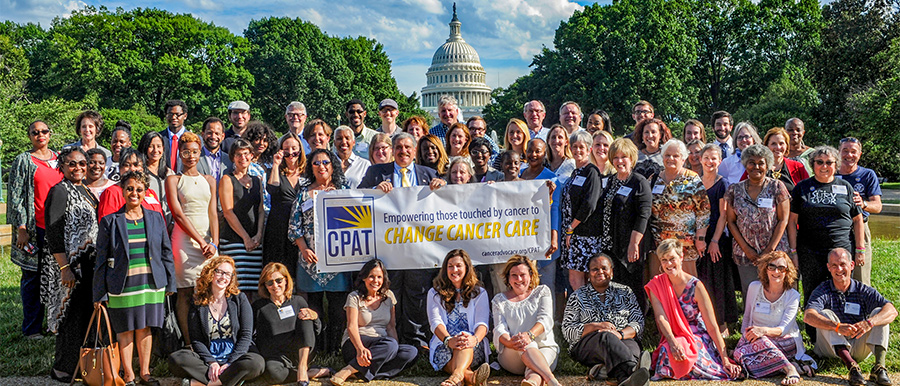 No one knows where or how to improve cancer care better than you—someone who has experienced it as a patient or caregiver. That’s why more than 700 advocates have joined the NCCS Cancer Policy and Advocacy Team (CPAT), a program designed to provide those touched by cancer with the tools and training to apply their experiences to become empowered advocates.
No one knows where or how to improve cancer care better than you—someone who has experienced it as a patient or caregiver. That’s why more than 700 advocates have joined the NCCS Cancer Policy and Advocacy Team (CPAT), a program designed to provide those touched by cancer with the tools and training to apply their experiences to become empowered advocates.
For more information about CPAT, contact us at cpat@canceradvocacy.org.
